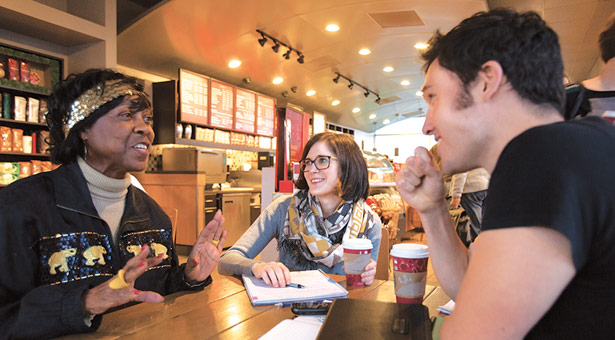The City Urban Perspectives
Gifts Across Generations
Nursing Students Partner With Older Adults for Learning and Friendship
By Deanna Duff | Photo by Mike Siegel

From left: Volunteer Rose Ratteray meets with SPU nursing students Lindsey Bruce Ono ’11 and Judah Ivy in a Tukwila, Washington, Starbucks store.
Rose Ratteray gets misty-eyed discussing the favorite gift she has ever received. Last Christmas, she was given a black, leather-bound edition of Spoon River Anthology to replace her 40-year-old, dog-eared copy. It sits in a place of honor next to her Bible — a visible pairing of friendship and faith.
“You can’t imagine how much that book means to me,” says Ratteray, in her early 60s. The present was from a Seattle Pacific University nursing student, a participant in the Older Adult Partnership Project. “It means so much that someone thought enough of me to do that.”
Launched in 2009, the Older Adult Partnership Project establishes meaningful, intergenerational connections. A pair of nursing students in SPU’s School of Health Sciences are teamed with a volunteer senior citizen. Groups meet four times throughout the academic year to interact, and students practice communication skills, health assessment, and breaking down possible stereotypes.
“It’s a real opportunity to work on our skills in a comfortable setting,” says first-year nursing student Lindsey Bruce Ono ’11. A 28-year-old former EMT, she is paired with Ratteray for the 2013–14 academic year. “It’s important to look at older adults as individuals and remember not everyone is the same because of age. I’ll now assess them in a deeper way.”
More than 200 students have participated in the program since its inception. While it is a graduation requirement for the student nurses, the process offers fulfillment beyond the grade.
“Older adults bring a lifetime of experience to the table,” says Carol Redfield, the Seattle Pacific instructor of nursing who coordinates the program. “They’re seasoned communicators and wise sages. They provide students examples of how to cope with adversity and live life.”
Older-adult participants range from 60 to nearly 100 years old. Most live independently and are active in their communities, from Federal Way to Everett, Seattle, and the Eastside. SPU collaborates with organizations — such as the Retired and Senior Volunteer Program of King County — to connect with volunteers, a core group of 45 older adults. Many have participated since the start.
“I think I may get more out of it than the students!” says Ratteray with a chuckle. “The best thing is they listen to me. It can be a struggle as you get older because you become more invisible in society.”
Ethan Crawford, 69 years old, is volunteering for the fourth year. Crawford and his wife welcomed a childhood friend into their home following a terminal cancer diagnosis. The nursing students were compassionate witnesses to the love and care surrounding the friend’s end-of-life process.
“I think they learned a lot from being part of that journey,” says Crawford. “The program addresses the mind, body, and spiritual side, and that really fits with the mission of Seattle Pacific.”
Brian Hinnenkamp, a second-year nursing student, was one of Ratteray’s previous student partners. The experience influences his current work as a nurse technician at the University of Washington Medical Center.
“The bedside should be honored and hallowed ground. It’s a privilege to serve people in a nursing capacity,” he says.
It was during a home visit that Ratteray read a poem to Hinnenkamp from her beloved but battered copy of Spoon River Anthology. Moved by her reading, he reciprocated by gifting Ratteray with a new edition.
“I wanted Rose to know that she was listened to in the moments we shared and that I valued our time beyond my own learning purposes,” says Hinnenkamp. “The experience meant so much more.”
